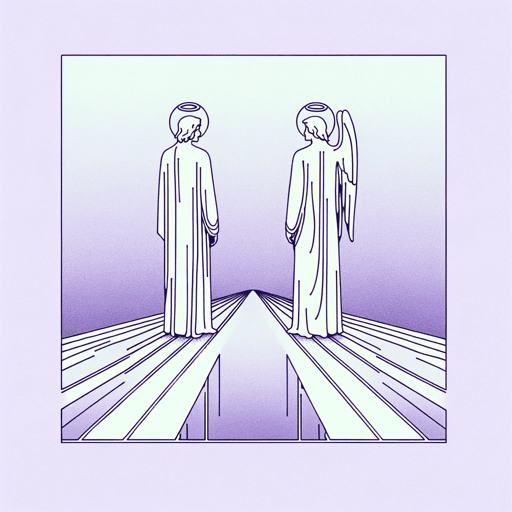55 pages • 1 hour read
Dante AlighieriParadiso
Fiction | Novel/Book in Verse | Adult | Published in 1320A modern alternative to SparkNotes and CliffsNotes, SuperSummary offers high-quality Study Guides with detailed chapter summaries and analysis of major themes, characters, and more.
Summary and Study Guide
Overview
Paradiso is the third and concluding part of The Divine Comedy, Dante Alighieri’s three-part epic narrative poem. It completes the allegorical journey initiated by the first two parts, Inferno (Hell) and Purgatorio (Purgatory). Beatrice, who symbolizes Dante’s ideal woman and who had previously accompanied him through the past part of Purgatory, here accompanies him as he journeys through the nine levels or spheres of Heaven, which are represented by various celestial bodies. In each sphere, Dante encounters various souls of the blessed who impart wisdom to him through insights into history, theology, and morality. As the journey reaches its culmination, Dante has a vision of Christ, the Virgin Mary, and finally God himself as he reaches the Empyrean, or highest sphere of Heaven, thus completing the poem’s allegory of the soul’s ascent to God.
Dante (c.1265-1321) is considered the preeminent figure in Italian literature, and The Divine Comedy one of the masterpieces of world literature. The Paradiso was completed shortly before Dante’s death in 1321.
This guide uses the 2007 English verse translation of the Paradiso by Robert Hollander and Jean Hollander, published by Doubleday. So that the reader may use this guide with other translations, quotations are cited using canto number and line number(s), thus: 1: 1-5.
Plot Summary
The entire Divine Comedy takes place during Holy Week of 1300, with the Paradiso beginning after Easter Sunday.
As the Paradiso begins, Dante and Beatrice are in Eden, or the earthly Paradise. Dante notices that Beatrice is staring upward at the sun, and Dante does so too. Beatrice explains that all things are naturally impelled upward towards God. Accordingly, the pair soon find themselves in a new and higher sphere—the first sphere of Heaven, represented by the moon.
Here Dante meets Piccarda Donati, who explains that there are ranks in Heaven and why the souls who dwell in the first sphere are so happy with their place. Beatrice quizzes Dante on the reason for the moon’s spots and explains how the waxing and waning of the moon are associated with inconsistency. As such, the moon houses souls whose word could not be trusted and who were lacking in courage. Their visit in this sphere of Heaven concludes with Beatrice’s avowal of the sacredness of keeping one’s vows and the importance of free will.
The second level of Heaven, represented as the sphere of Mercury, is where Dante and Beatrice meet the emperor Justinian, who explains the history and destiny of Rome. As Mercury is difficult to observe due to its proximity to the sun, this sphere of Heaven represents those who did good deeds out of a desire for recognition and fame. Therefore, Justinian’s explanation of this realm focuses on Julius Caesar’s lust for power and glory, and how such vain desires hold no relevance in Heaven.
The planet of Venus is the third sphere of Heaven, wherein Dante meets Charles Martel of Anjou. Martel reminds Dante that the key to a functioning, well-rounded society is the inclusion of people from a wide variety of backgrounds. The two also happen upon another individual, the troubadour and poet Folco of Marseilles, who speaks to them of the temptations of love.
The fourth sphere of Heaven is depicted as the sun. Here Dante encounters examples of prudence, the souls of the wise who help illuminate the earth intellectually. The most prominent of these is St. Thomas Aquinas, the famous theologian, who introduces the souls of several other churchmen, including Saints Francis, Dominic, and Bonaventure, who laments the present corruption of the monasteries.
The fifth level of Heaven is the sphere of Mars. As this planet is typically associated with the god of war, Dante recognizes this sphere as the home of the warriors of the faith who sacrificed their lives for God. Here Dante meets his ancestor Cacciaguida, who discusses the virtue of Florence while bemoaning how the city has declined in recent years. Cacciaguida comments on the noble Florentine families and conveys to Dante the importance of his exile: He is to fulfill his poetic mission by telling the world what he has seen in Hell, Purgatory, and Heaven. Dante and Beatrice then meet other champions of the faith, including Joshua, Charlemagne, and Judas Maccabeus.
As the sixth level of Heaven, Jupiter, is typically associated with the king of the gods, Dante portrays this sphere as the home of souls who displayed justice. They spell out a Latin phrase in praise of justice, then form a giant eagle that speaks to Dante of justice and inscrutability. The rulers comprising the eagle include biblical kings, the Roman emperors Constantine and Trajan, and a pagan who was saved by God due to his righteousness.
Given that the sphere of Saturn, the seventh level of Heaven, is the farthest planet from the Earth (as conceived of in Dante’s time), it is identified by Dante as the home of those who embody temperance and dedicate their lives to prayer and contemplation. Dante envisions these people climbing up and down a golden ladder. It is here that he meets the reforming monk St. Peter Damian, who speaks of the corruption of the church. He also meets St. Benedict who, likewise, is angered by what he sees as a moral decline in the church.
Still accompanied by Beatrice, Dante enters the eighth level of Heaven, otherwise known as the Fixed Stars, the realm of the constellation Gemini. Here Dante glimpses the Virgin Mary in glory, as well as other biblical saints such as the apostles John, Peter, and James, who test Dante’s knowledge about faith, hope, and love. Dante also meets Adam, who explains how long he lived in Eden and why he incurred the wrath of God. Before departing, Dante and Beatrice witness St. Peter’s anger with the papacy, specifically the incumbent, Pope Boniface VIII.
The ninth and final level of Heaven, also known as the Primum Mobile, is the last sphere of the physical universe. It is directly controlled by God, and any action or movement in this sphere affects all the spheres beneath it. It is here that angels live, and where Dante gets the first glimpses of God as an intensely bright point of light surrounded by nine rings (or hierarchies) of angels. As they slowly ascend to the Empyrean, Beatrice shares with Dante the story of creation and the history of the angels, while also touching upon the creation of the universe.
Once they reach the Empyrean, Dante and Beatrice have ascended to a realm beyond physical existence, which is where God resides. Throughout the Paradiso, Beatrice has served as a metaphor for theology; now she is transformed and made more beautiful than ever. Dante becomes enveloped in light, which permits him to see God.
As the Paradiso—and the Divine Comedy—ends, Dante is trying to understand how the three circles he sees, representing the Father, Son, and Holy Spirit, work together to form one divine entity. In an instant, he understands and becomes all the more convinced of God’s eternal love.
Related Titles
By Dante Alighieri
Featured Collections
Allegories of Modern Life
View Collection
Beauty
View Collection
Books on Justice & Injustice
View Collection
Medieval Literature / Middle Ages
View Collection
Mortality & Death
View Collection
Philosophy, Logic, & Ethics
View Collection
Religion & Spirituality
View Collection
School Book List Titles
View Collection




